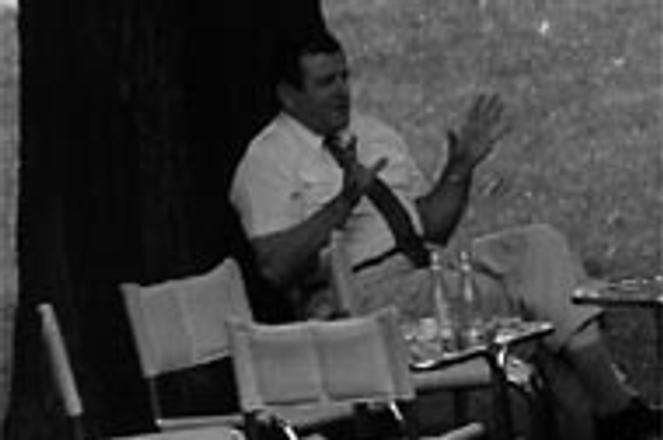These certainly were better times in Slovak-Czech relations as Prime Minister Vladimír Mečiar and Czech Premier Václav Klaus iron out the separation of the Czechoslovak Federation in late 1992 out of earshot of the press and almost out of viewing range as well. In recent weeks, Klaus has refused to meet with Mečiar, saying his schedule was too packed to accommodate the Slovak premier on a Prague visit. Mečiar wants to settle a wide range of issues such as gold payments and bank shares.Peter Brenkus
While Slovak-Czech relations remain electric after a series of diplomatic lightning bolts resulted in Bratislava yanking its ambassador from Prague, both countries' leaders behave as if they've lingered too long in the sun, refusing to bury the issue. So the inversion lasts, with no peaceful skies visible in the forecast.
On April -, the Slovak foreign ministry called Ivan Mjartan, its ambassador to the Czech Republic, to Bratislava "for consultations," according to the ministry's statement.
Dušan Matulay, head of the foreign ministry's press department, said that calling ambassadors for consultations is a routine procedure. He said he did not know how long Mjartan would stay in Bratislava.
şşThe practice of calling ambassadors to [ministry] headquarters is normal any time complications in mutual relations occur,'' said Eduard Kukan, a former minister of foreign affairs. şşIt's an appropriate measure, providing [the consultations] don't take too long.''
However, almost two weeks later, Mjartan was still enjoying his time in Bratislava, participating in among other things a ceremony honoring the best players in a hockey match between Slovakia and Italy hockey match on April 18.
Mjartan was appointed ambassador to the Czech Republic in early 1993, following the split of the Czechoslovak Federation on January 1, 1993. The decision to call him back was widely viewed as another link in a chain of diplomatic whips Vladimír Mečiar's cabinet has used to flog Czech President Václav Havel for what they and others view as his diplomatic recklessness.
Before beginning his post-surgery convalescence, Havel hinted that Meciar could use some treatment of his own. In an interview for the French daily Le Figaro, Havel, addressing NATO's enlargement, said: şş[NATO] should outline a concept of enlargement, some sort of a schedule. It should explain why some country should be accepted earlier and the other later... It should declare that no one is discriminated against - as Mr. Meciar believes in his proverbial paranoia - and that no one is excluded a priori.''
Mečiar didn't take long to retaliate. His cabinet issued a statement asking Havel to publicly apologize to the Slovak premier. şşThe statements made by President Havel to the Le Figaro daily...we consider a coarse violation of fundamental ethics used in communications between representatives of two sovereign countries,'' the resolution read.
Saying that the Czech president şşinappropriately interfered in Slovakia's internal affairs'' and defamed Mečiar abroad, the statement claimed that Havel şşdeliberately worsened mutual relations between our countries and nations.''
Therefore, we emphatically demand that ...Mr. Václav Havel...publicly apologize to Mr. Vladimír Mečiar,'' the statement concluded.
The verbal shootout sparked differing reactions. Even those who oppose a Havel apology were surprised by his choice of words, one press report said.
I believe that neither side's steps were appropriate, and both sides are damaging Slovak-Czech relations,'' Kukan said. It's normal when politicians comment on a situation in a neighboring country, but these comments should be tactful and appropriate. President Havel didn't stick to this criterion.''
Kukan didn't endorse the Mečiar cabinet's reaction, either. şşThe statement is exaggerated and especially inappropriate in its form,'' he said. şşAn inappropriate step from one side must be countered clear-headedly rather than with an even more inappropriate measure.''
As of the end of last week, Havel, vacationing in the Italian Alps, hadn't apologized. However, Mečiar hasn't made it any easier for him, adding another condition to reconciliation on April 10. He declared that he would not visit Prague until the Czech National Bank returns 4.1 tons of gold that belongs to Slovakia.
Slovakia hasn't received the gold since the end of 1992, when the Czechoslovak central bank's gold reserves were divided between the two countries by a ratio of 2:1. Apart from the 4.1 tons, Slovakia seeks to purchase another 4.96 tons that it claims is part of its golden treasure from the period of the Slovak War State in 1939-1945.
In an attempt to break the deadlock, Vladimír Masár, governor of the National Bank of Slovakia, last week wrote a letter to his Czech counterpart, Josef Tošovský, proposing to purchase the 4.96 tons for a so-called balance price, which is 8-10 times less than market value. The governors are supposed to meet this week on the plan.


